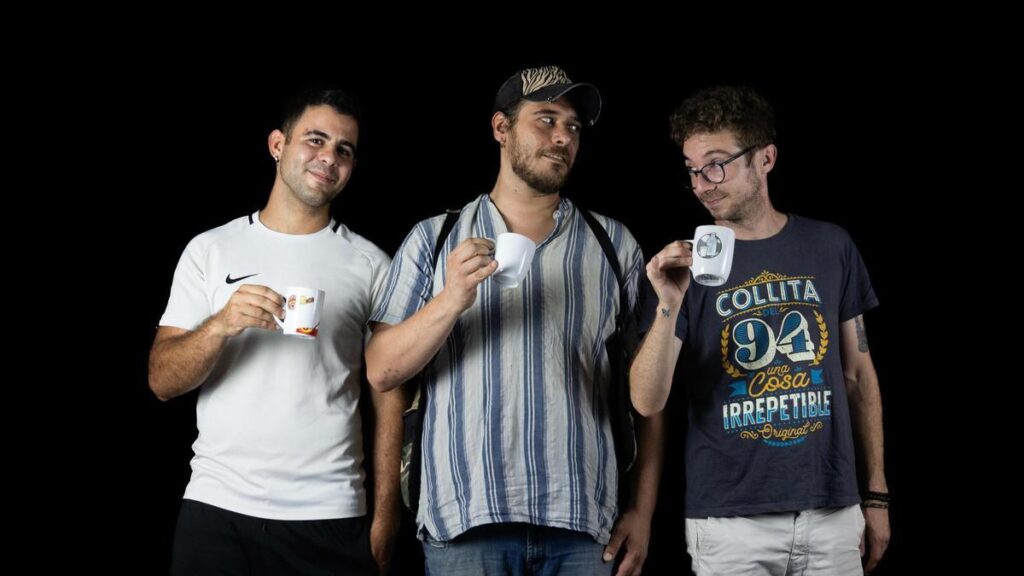
Technical file
Formación: Pau Pastor (Voice), Jose Soler (Voz), Pau González (voice), Paco Giner (voice and guitar), Fran Molinese (drawer, guitar), Paco Manyas (Dolçaina), Albert Sala (illustrations), Samuel Soler (videos) and Nakar Beats (instrumental)
Origin: Mutxamel
Discos:Mixed Paella (2020), Roots and wings (2024)
Year of creation: 2018
A root sound that extol popular culture and promotes resistance from everyday life. Sneak It is a group born in the streets of Mutxamel, a group of artists who have joined to make music for and for their people. At a time where the labels mark the listening, they uncheck from the predominant industry betting on the genres that have influenced them on a personal level: a mixture of hip hop, miscegenation and traditional sounds that make up a genuine and difficult project to typecast. A proposal defined by creative freedom, without accountable to anyonebecause they do what they want and how they want, something as simple as revolutionary, without asking permission and with the people always in the center.
They made themselves known with a first model, Mixed Paella (2020), where the sound was still more rudimentary, but served to make it clear that they came with the intention of staying. They placed a first stone in an industry that they step carefully, but with determination. The quality jump would come with Roots and wings (2024), an EP much more consistent with the identity of the group: “The idea was to talk about our roots, our environment and our people,” they explain. An attempt to portray a lifestyle that is being lost, without pamphlets, but with a clear message. Each song thus becomes a different snapshot within the same memories album, where emotions are explored so varied that they mark their day to day.
They say that they are not a claiming group, at least not from a incendiary or explicitly political lyric, but in an era where many songs are composed to say anything, expressing the emotions of a people is already a fully revolutionary act. To this is added the use of a language that in large cities is increasingly threatened and that, as they remember, needs culture to remain alive. “In the villages there is still Valencian, but in cities like Alacant, Elx or Santa Pola is being lost,” they warn.
From the outside, his fight is observed in amazement, but there is a danger that this is the exception and that they do not feel the collaboration of an entire province to rescue a language in danger of extinction: “The hardest thing is that sometimes Catalans come to our concerts and are excited to see that the language is defended here,” says Paco El Mut, one of the group's voices. “There We become aware that we have our own struggle: to keep a language alive that is dying in our area. And that struggle can only come from popular culture, from casals such as Uncle Cuc, Muixerangues or Music. “
Therefore, beyond music, Mawla symbolizes a form of cultural resistance. Not from rage or confrontation, but from everyday life: “Our songs are not pamphlets. We have not hung to Mazón In no video clip, at least, but we do talk about our people, our language and our way of living “Pau González, another of the band's vocalists, points out. A claim understood from an unexplored prism, a fervent achievement of individual and minority achievements that represent a whole. “Being claiming is not just shouting in a demonstration, sometimes it is talking about your grandmother, your neighborhood, that you cannot buy bread; that is also fighting and focusing on concrete issues.”
Look at the future
With a solid basis in the support of the close environment, Mawla looks at the future without great commercial ambitions, with a clear commitment to his way of understanding music: “We are clear that Mawela is not called to success, nor do we look for it,” they say. “Music is a means for other things, not an end in itself.” A unusual philosophy in the current scene, where the focus is usually to grow, professionalize and turn.
Its objective, however, is another: continue to contribute content to popular culture and be a tool to reconnect with the identity of a province that, according to them, is losing its roots. “Mawela is the voice of our grandmothers and the guitar of our streets”, summary, claiming a tradition that is not seen with nostalgiabut with hope and yearning.
They are currently in the phase of ideas for their next work. “There is nothing recorded yet, but we are wanting to do a third project with a more defined sound, more care in production, but without losing the essence.” The intention is clear: to recover traditional elements, as they already did in Roots and wings With Dolçaina, but giving them a new life. “We do not know what the new sound will have, but we know that it will be ours. It will be Valencian, it will be town, and it will be really,” concludes Paco.
At a time when Valencian music loses its great referents, the time has come to distribute the cake and open space to new local formations in festivals that were previously dominated by Valencian bands “mass”. While that does not happen, They will continue to war where they are given an opportunity: turning through the peoples and demonstrating that there is another way of making music, away from the current standards and deeply connected with a different way of understanding the environment. His next concert will be on July 25 at the Fretta de Sant Jaume in Campello.
Subscribe to continue reading